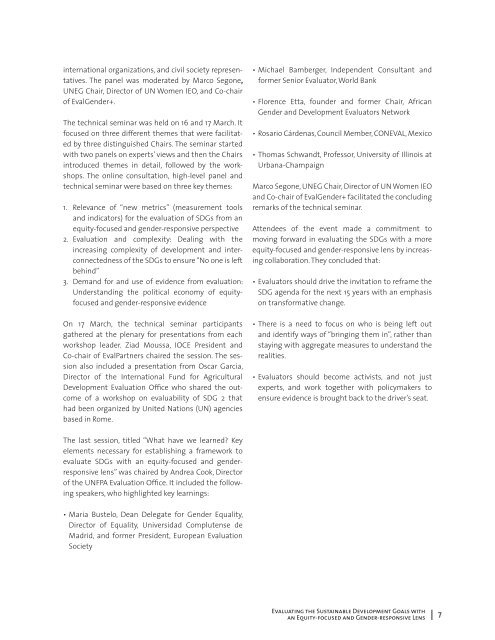NO ONE LEFT BEHIND
NY-Events-Report_WEB
NY-Events-Report_WEB
Create successful ePaper yourself
Turn your PDF publications into a flip-book with our unique Google optimized e-Paper software.
international organizations, and civil society representatives.<br />
The panel was moderated by Marco Segone,<br />
UNEG Chair, Director of UN Women IEO, and Co-chair<br />
of EvalGender+.<br />
The technical seminar was held on 16 and 17 March. It<br />
focused on three different themes that were facilitated<br />
by three distinguished Chairs. The seminar started<br />
with two panels on experts’ views and then the Chairs<br />
introduced themes in detail, followed by the workshops.<br />
The online consultation, high-level panel and<br />
technical seminar were based on three key themes:<br />
1. Relevance of “new metrics” (measurement tools<br />
and indicators) for the evaluation of SDGs from an<br />
equity-focused and gender-responsive perspective<br />
2. Evaluation and complexity: Dealing with the<br />
increasing complexity of development and interconnectedness<br />
of the SDGs to ensure “No one is left<br />
behind”<br />
3. Demand for and use of evidence from evaluation:<br />
Understanding the political economy of equityfocused<br />
and gender-responsive evidence<br />
On 17 March, the technical seminar participants<br />
gathered at the plenary for presentations from each<br />
workshop leader. Ziad Moussa, IOCE President and<br />
Co-chair of EvalPartners chaired the session. The session<br />
also included a presentation from Oscar Garcia,<br />
Director of the International Fund for Agricultural<br />
Development Evaluation Office who shared the outcome<br />
of a workshop on evaluability of SDG 2 that<br />
had been organized by United Nations (UN) agencies<br />
based in Rome.<br />
••<br />
Michael Bamberger, Independent Consultant and<br />
former Senior Evaluator, World Bank<br />
••<br />
Florence Etta, founder and former Chair, African<br />
Gender and Development Evaluators Network<br />
••<br />
Rosario Cárdenas, Council Member, C<strong>ONE</strong>VAL, Mexico<br />
••<br />
Thomas Schwandt, Professor, University of Illinois at<br />
Urbana-Champaign<br />
Marco Segone, UNEG Chair, Director of UN Women IEO<br />
and Co-chair of EvalGender+ facilitated the concluding<br />
remarks of the technical seminar.<br />
Attendees of the event made a commitment to<br />
moving forward in evaluating the SDGs with a more<br />
equity-focused and gender-responsive lens by increasing<br />
collaboration. They concluded that:<br />
••<br />
Evaluators should drive the invitation to reframe the<br />
SDG agenda for the next 15 years with an emphasis<br />
on transformative change.<br />
••<br />
There is a need to focus on who is being left out<br />
and identify ways of “bringing them in”, rather than<br />
staying with aggregate measures to understand the<br />
realities.<br />
• • Evaluators should become activists, and not just<br />
experts, and work together with policymakers to<br />
ensure evidence is brought back to the driver’s seat.<br />
The last session, titled “What have we learned? Key<br />
elements necessary for establishing a framework to<br />
evaluate SDGs with an equity-focused and genderresponsive<br />
lens” was chaired by Andrea Cook, Director<br />
of the UNFPA Evaluation Office. It included the following<br />
speakers, who highlighted key learnings:<br />
••<br />
Maria Bustelo, Dean Delegate for Gender Equality,<br />
Director of Equality, Universidad Complutense de<br />
Madrid, and former President, European Evaluation<br />
Society<br />
Evaluating the Sustainable Development Goals with<br />
an Equity-focused and Gender-responsive Lens 7


